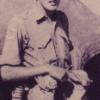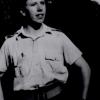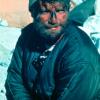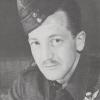On 29 September 1944 the Church Times wrote of the sorrow and disappointment of the nation on hearing of the withdrawal of Airborne Forces from Arnhem. The article concluded with these words:-
"One BBC correspondent, describing the escape, remarked that the men slipped off into the darkness after a prayer by the Padre. The Church may be proud of her clergy who go into the hazards of such battles with their men."
Fifteen chaplains were present at Amhem. On Sunday 17 September 1944, eight [nine]took off by glider and four [six] parachuted in.
The Rev John Rowell, with the Border Regiment took off in a thick mist from Burford. As they came out of the clouds they were so out of position in relation to their towing aircraft that the pilot had to cast off and the glider landed in a field of stubble close to Oxford. The rest all arrived safely.The Rev John Morrison, a Presbyterian Minister with the King's Own Scottish Borderers, was most heartened to hear the skirl of Pipe Major Laidlaw's pipes as he left his glider.
Late that afternoon the three Parachute Battalions moved off on their six mile approach to the bridge at Amhem. The Glider Borne troops were to secure the dropping and landing zones for the second lift. Already the chaplains were occupied in burying the dead and in assisting with the wounded. The 2nd Battalion The Parachute Regiment got through and held the northern end of the bridge until the Thursday morning. The fighting here was bitter, with lightly armed Airborne troops holding off repeated tank and infantry attacks. The Regimental Aid Post was set up in a cellar underneath the battalion's headquarters. Here Fr Bemard Egan SJ MC who had been the battalion's chaplain since 1941 assisted the two doctors. At one time there were over two hundred wounded in that cellar. On the Tuesday evening German tanks shelled the headquarters and the building was filled with acrid, choking smoke. Fr Egan was hit and was evacuated into captivity the next day.
The German respect of the Red Cross, even in the confusion of battle was of a high standard. The Rev George Pare on the second day went to some injured in a small clearing. A covering party was left at the edge of the clearing, and Pare, after committing himself to God, went out alone and then summoned his medical orderlies and their jeeps. As they left the clearing there was a fusillade of shots from the Germans on the far edge of the wood.
The other two battalions were increasingly pinned down on the outskirts of Amhem. Whole companies were wiped out and the situation began to be precarious. The Rev GL Phillips with the 3rd Battalion moved into the outskirts of Amhem. They went to ground and Phillips found himself in a house with the doctor, and their brigade and divisional commanders on the floor above. German tanks clanked along the sweet outside. On the Tuesday the doctor decided to visit a nearby hospital where there were British wounded. The chaplain went with him and they slipped in through the back door. A little later Phillips found that the Germans had surrounded the place, and he was taken prisoner. Fr D McGowan though, who came with the Parachute Surgical Team working In that hospital, was allowed to remain there throughout the battle. The Rev A Buchanan with the South Staffordshires was also taken prisoner in the vicinity of the hospital.
The second lift on the Monday met heavy opposition on landing. The Rev RF Bowers, with the 10th Battalion, broke his leg on the drop. He did what little he could with assisting the wounded and burials and then on the Tuesday tried to get a jeep loaded with wounded to a hospital. He came under intense mortar fire and had to turn back. He rejoined the Aid Post as it was overrun by Germans. Bowers, remaining with the wounded, found himself at the wrong end of a German bayonet and had to point firmly at his Red Cross armband. The Rev Alastair Menzies with 156th Battalion The Parachute Regiment also had the misfortune to be taken prisoner almost immediately on landing. The Rev HJ lrwin dropped with the 11th Battalion The Parachute Regiment. He moved with them towards Amhem, and ferried some wounded to a hospital set up in a hotel by the Divisional Headquarters. Here Pare encouraged him to wear a dog collar so that his men could immediately recognise him. He made one out of paper. A short time later he was killed by a mortar bomb.
By the Wednesday it was obvious that there was no hope of reinforcing the 2nd Battalion at the bridge and a perimeter began to emerge, just touching Arnhem and going to the bank of the Neder Rijn, about two miles long and half a mile wide. For the next six days this area was held by the 1st Airborne Division against continuous bombardment and repeated attacks. The Chaplains worked with the wounded with the exception of The Rev R Talbot-Watkins, a Methodist minister with the 1st Battalion The Parachute Regiment, who had been with them, like Egan, from the beginning. Initially he assisted the doctor but after he was taken prisoner Watkins took over his duties. However, by the Wednesday the 1st Battalion was reduced to three officers and less than two hundred men. This remnant looked to Watkins for military as well as spiritual leadership. They were not disappointed.
By the Thursday nine chaplains remained with their units. This number was reduced to eight when a Tiger tank shelled the temporary hospital where Fr Benson was working. His right arm was shattered when he went to the help of other wounded. The arm was amputated immediately. When he heard that he would never be able to celebrate Mass in the usual way he lost the will to live and died two days later. His place in the hospital was taken by Pare, whose work typified that of the other chaplains. He constantly went round encouraging the wounded, helping them and the doctors, comforting the dying, scrounging food and water, and every evening taking a brief service on each of the packed wards.
The Senior Chaplain, the Rev AWH Harlow, was either at the Divisional Headquarters or assisting in an Aid Post. He was an older man with grey hair, whose calm and sense of humour gave a peace to those around him. Throughout the battle the chaplains reminded the others of normality. The prayers offered by those men were as much a part of that battle as each round fired. Harlow himself went into voluntary captivity on the Saturday. A truce had been arranged to enable the wounded to be handed over to the Germans, and Harlow was asked to accompany a group of these.
In the southern part of the perimeter the Gunners had set up their Aid Post in the house of a Dutch solicitor. His wife, Kate ter Horst, and their children remained there throughout the battle, living in the cellar. Eventually this was the only place providing medical care in the southern part of the perimeter. The house became so packed with wounded that it was only possible to move by walking on stretcher handles. The dead were piled outside. Mrs ter Horst never complained. Instead she offered every help possible. From the Saturday night onwards she went round even room reading the 91st Psalm from the Chaplain's Bible.
The Chaplain the Rev S Thorne was a quiet, shy man who never left the vicinity of the house and who was the exact opposite to Watkins and his more military approach. Mrs ter Host was surprised to see him clearing out a lavatory, a task which no German officer would have done. But this man had another side to him. On the second Monday German tanks broke into the perimeter and shelled the Aid Post. Thorne and a Bombardier Bolden went out and confronted the tank, holding up a Red Cross flag between them. The tank withdrew.
The withdrawal across the river took place on the Monday night. The Rev WR Chignell was the chaplain who said prayers in the cellars of The Divisional Headquarters. Then, with his boots bound to deaden the noise like the others, he joined the silent procession down to the river. It was a wild dirty night, ideal for a withdrawal, and Chignell was glad when he got to the bank of the river and found an assault boat, as he was a non-swimmer. The Rev J Rowell, who had reached Arnhem on the second day after his glider's emergency landing, took a party of wounded across the river. The Rev R Talbot-Watkins asked Bombardier Bolden to gather those wounded who could make it, and he took thirty severely wounded men across. Then he went back to look for more. He could find none on the other side but dawn broke, so he had to lie up during the day in the river bank, and swim across the river the next night.
Three chaplains remained with the wounded. The Rev S Thorne felt it his duty to stay, and once the withdrawal started he collapsed into a deep sleep. The Rev G Pare also fell asleep for the first time in days. He did not know about the withdrawal and was surprised at the silence the next morning. It was then his job to tell the wounded in the temporary hospital what had happened. The Rev J Morrison decided to stay with his wounded.
After the battle many of the wounded were moved to a converted barracks at Apeldoorn. Harlow, Pare, Buchanan and Thorne still had a vital ministry to perform. But eventually the numbers decreased and the chaplains themselves began to be moved into Germany. Thorne and Pare went together. Thorne decided that he should stay with the wounded but Pare jumped the train, and after several narrow escapes was sheltered by the Dutch underground. Fr McGowan was eventually moved to Apeldoorn from the hospital at Arnhem. Before moving h he literally buried two loads of arms which the Dutch underground later retrieved and then he escaped from Apeldoorn with a Dr M Herford. They took four days to reach the Rhine, but at the bank they got split up, and McGowan was stumbled upon by a German sentry, who almost bayoneted him, and was recaptured. He had come so close, it must have been a bitter disappointment.
On the 25th anniversary in 1969 twelve of those fifteen chaplains still survived. Five were parish priests, one a bishop, one a headmaster, others a school chaplain, a Circuit superintendent, a Benedictine monk, an Army Chaplain and one had resigned his orders to become a probation officer.
Reproduced from the Pegasus Journal December 1987
Read More




Latest Comments
There are currently no comments for this content.
Add Comment
In order to add comments you must be registered with ParaData.
If you are currently a ParaData member please login.
If you are not currently a ParaData member but wish to get involved please register.